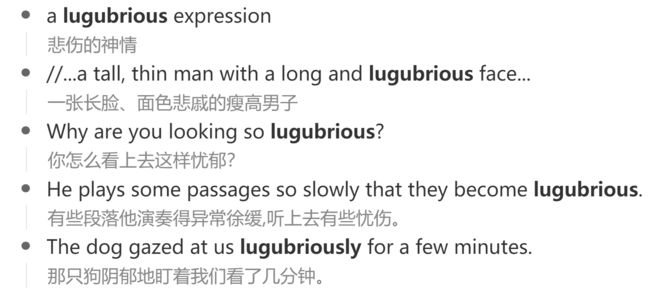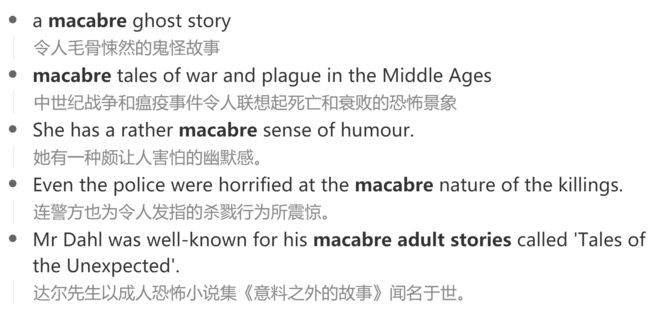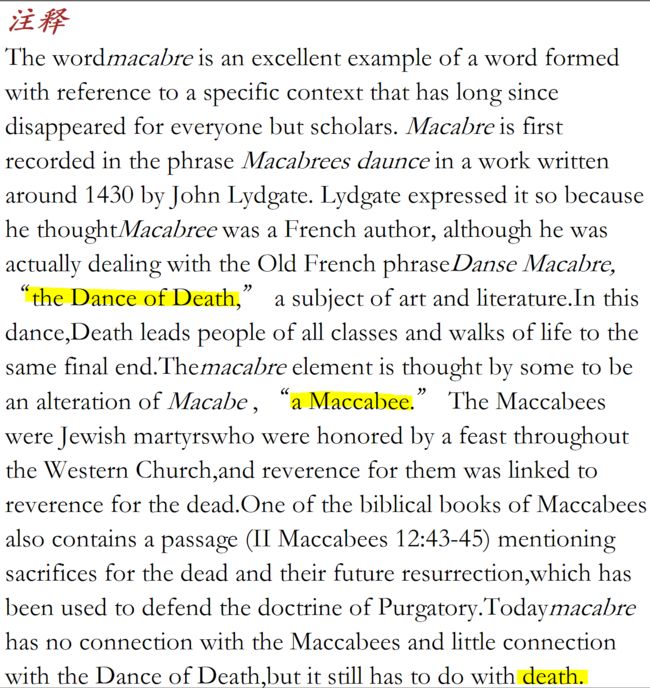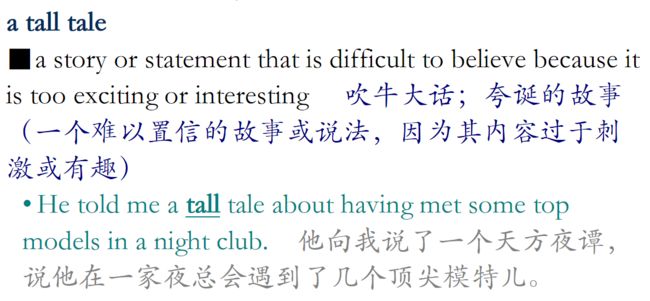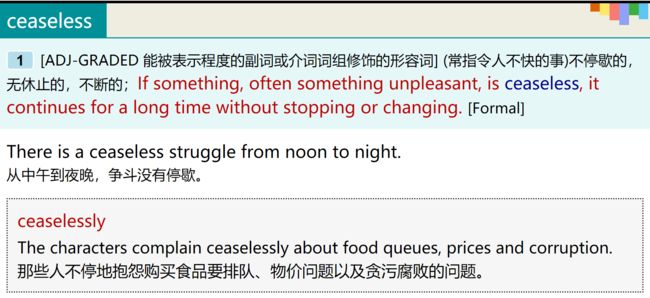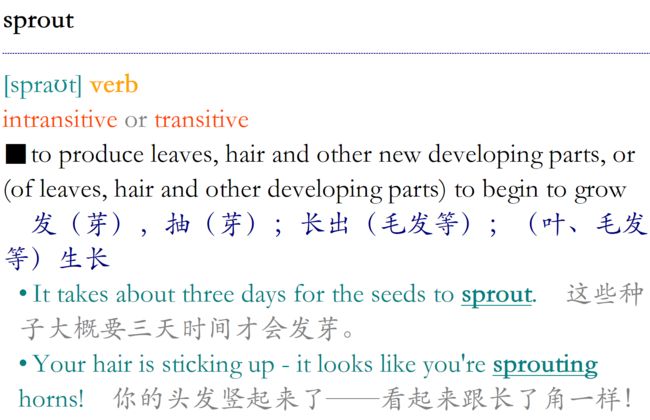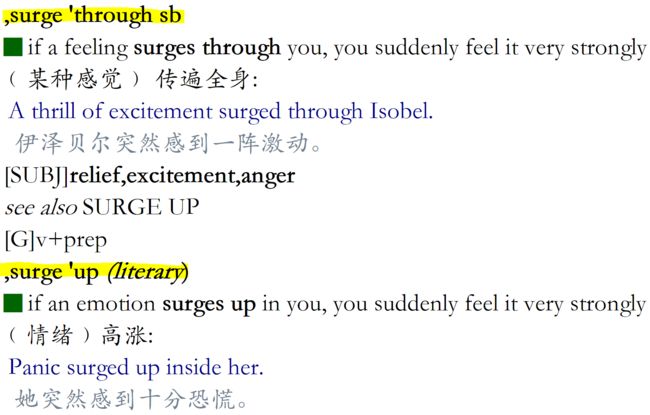THE ART OF PAINTING 国画 | Chapter 20
2017年12月28日, 星期四
<1> In their spare time, Li Kunglin painted horses to amuse himself, Huang wrote lugubrious or macabre verse on ghosts, and they told one another tall tales of Taoists and fairies.
lugubrious
lugubrious 表示阴郁的;悲哀的;dismal; mournful; 尤其是达到一种夸张或荒谬可笑的程度。
vocabulary.com 对 lugubrious 的用途有如下说明:“Funerals are lugubrious. So are rainy days and Mondays. Anything that makes you sad, gloomy, or mournful can be called lugubrious.”
字典中 lugubrious 的例句有:
macabre
macabre 表示恐怖的;阴森森的;令人毛骨悚然的;令人联想起死亡和衰败的恐怖景象的 Suggesting the horror of death and decay尤指与死亡等相联系。
美国传统双解词典中给macabre语源给出了详尽的注释:
死神之舞 Danse Macabre
Macabre 最早见于短语 Macabrees daunce,是在1430年前后约翰·利德盖特写的一本书中。 实际上他指的是一个古老的法语短语Danse Macabre,一个艺术与文学的主题—— “死神之舞” 。在这个舞蹈中,死神把各种各样的人带到了同一个终点。马加比人 The Maccabees
也有认为macabre 是 Macabe 的变体——“马加比人”。 马加比们就是那些犹太殉道者,在天主教会中通过节日表达对他们的敬意,对他们的尊敬和对死的敬畏是联系在一起的。今天,macabre 与马加比人毫无联系, 与死神之舞相关甚少,但它仍与死亡有关。
tall
tall 有一个非正式的用法,表示 幻想性的或夸张的;吹牛的 fanciful or exaggerated; boastful;
a tall order 表示 困难的任务;无理的要求 difficult task or unreasonable request
另有 stand / walk tall,表示 昂首挺胸;理直气壮:If you say that someone walks tall, you mean that they behave in a way that shows that they have pride in themselves and in what they are doing.
<2> I have been trying ceaselessly day and night to collect your writings. Recently I have obtained two pieces of paper by exchanging three pieces of silk for them. If you have recent manuscripts, you should give them to me and not let me keep on wasting my silks.
王诜:吾日夕购子书不厌,近又以三缣博得两纸字。有近画当稍以遗我,勿多费我绢也。
这段以绢换画的故事,让我想起第十四章苏轼杂记中回忆好友画竹名家文与可,关于爱画惜竹,以绢为袜,不以世俗而论的情怀和谈笑:
- 文与可:“拟将一段鹅帮绢,扫取寒梢万尺长。”
He added two lines in postscript saying that he wished to paint a bamboo grove ten thousand feet high on a piece of Goose Valley silk. - 苏东坡:“世间亦有千寻月,竹落庭空影许长。”
"There are bamboos ten thousand feet high, when you look at their shadows cast by the moonlight."
链接:ARREST AND TRIA 逮捕与审判 | Chapter 14
“世间亦有千寻月,竹落庭空影许长。”扫取,是挥写而成的意思。寒梢,指经冬不凋的长长的竹枝。这两句诗体现了文同的墨竹画法:一挥而就,即“扫取”,画在短短的一段绢绸上,却具有直节云霄之势,所谓“万尺长”。画家在自己的作品里对现实客观事物所进行了提炼、集中、夸张和渲染。
结合本章中我最喜欢的这一段:
Some copy the inimitable grace of a dried vine ending in a gentle, restful curl, with a few delicate leaves for balance. It should not be forgotten that the balance of a withered hanging vine is naturally perfect because the shape and angle of inclination of the tip depends upon the total weight of the vine, the support of the stalk, and the weight of the remaining leaves on one side or the other.
枯枝小叶的平衡,蜷曲上翘的姿态,细节处尽皆是自然的精妙完美。“诗画本一律,天工与清新”。“天工”,意谓出于自然,无须雕琢。凡出自“天工”者,必有创作者个性,给人以“清新”之感。画作深植于自然本真,更源于创作者心性投射。
<3> Receiving the moisture of wine,
My intestines sprout and fork out,
空肠得酒芒角出
And from out my liver and lungs
Shoot rocks and bamboos,
肝肺槎牙生竹石
Surging through my breast, irresistible,
森然欲作不可回
They find expression on your snow-white wall.
吐向君家雪色壁
A sprout is a small growth on a plant — a little new bud. Other things can sprout too: kids are constantly sprouting (growing).
The key thing to think of when you're trying to remember the meaning of sprout is growth — as a noun, a sprout is a new growth of a plant, and as a verb, to sprout means to grow. Sprouting mainly applies to height and to the young, whether you're talking about plants, people, or things. An older person who gains fifty pounds is growing but not sprouting.
fork
fork 作为动词,有树枝分岔或河流分支等的意思,to separate into branches or branchlike parts ,这个意思下fork 的同义词有:
bifurcate, branch (out), diverge, divide, ramify, subdivide
sprout and fork out 在苏轼诗句原句中对应“”的是“芒角出”。
“芒角”在古文当中通常有四个意思:
- 指植物的尖叶。
“空肠得酒芒角出”即取此意。 - 指星辰的光芒。
苏轼在其《夜泛西湖》诗之三中也使用了“芒角”:“苍龙已没牛斗横,东方芒角昇长庚。” - 指笔锋。
- 指棱角。
surge
surge 的意思是 (感情、感觉)突袭,涌动,突发;使强烈地感到 to fill sb with a strong feeling,如:
- Relief surged through her. 她顿觉宽慰。
surge 也可以作为名词,意思是 (情感的)涌起,翻涌 a sudden increase of an emotion,如:
- adrenalin surge 肾上腺素刺激
- She was overwhelmed by a surge of remorse. 悔恨一下子涌上她的心头。
surge through 和 surge up 的意思相近:
A surge is a sudden strong swelling, like a tsunami wave that engulfs the land. Although a surge offers a fluid image, anything can experience a sudden surge, including emotions, political support, or an angry mob. If an emotion or sensation surges in you or through you, you feel it suddenly and powerfully.
本章最后的半首诗,出自苏轼《郭祥正家,醉画竹石壁上,郭作诗为谢,且遗二古铜剑》,诗写他喝下一点酒后,情绪兴奋起来,萌发作画兴致,好像脏腑里生长了竹子、石头,横七竖八地往外冒,非表现出来不可。
米芾《画史》说:“子瞻作枯木,枝干虬屈无端,石皴硬。亦怪怪奇奇无端,如其胸中盘郁也。”可见苏轼绘画的得心应手、挥洒如意是上升到了得道的高度,而不停留在绘画技巧本身,他更讲求形象的气韵生动,而不追求外在体貌的形似。画是才气与志趣的寄托,而他实际是了解、掌握了事物规律的人。
以上。
